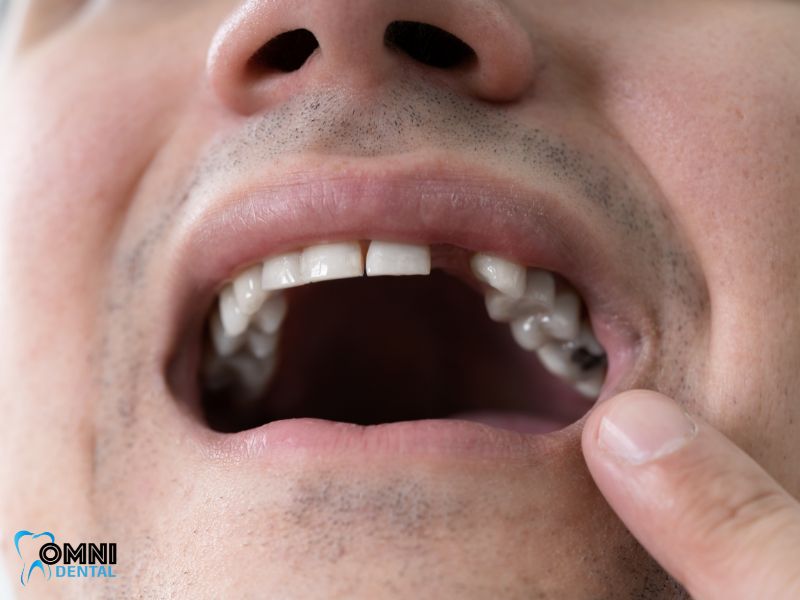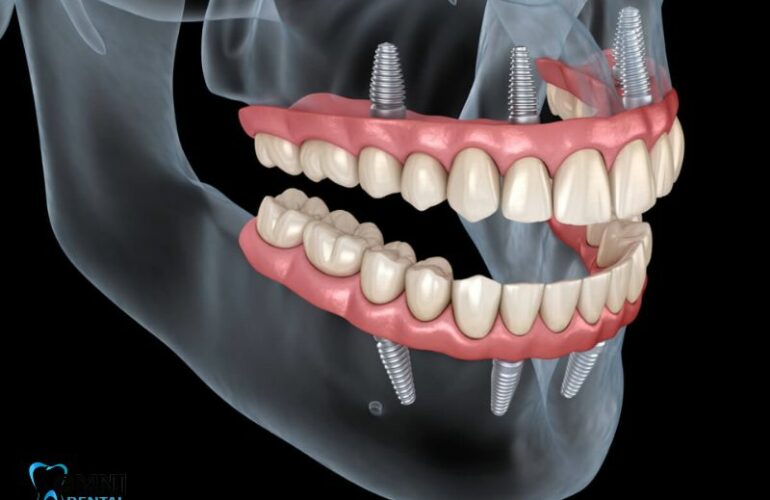Understanding Dental Implants
Dental implants have become increasingly popular as a preferred method of tooth replacement. But what exactly are they?
What are Front Teeth Implants?
Front teeth implants are dental implants that replace the visible teeth in the front of the mouth. Dental implants are an excellent solution for replacing missing teeth because they feel, function, and look like natural teeth. They consist of a titanium post surgically implanted into the jawbone, acting as an artificial root to support a replacement tooth or bridge.
Components of Dental Implants
A dental implant has three parts. The first is the implant itself, a screw that acts as the tooth’s root. The second component is an abutment that connects the implant to the third part, the crown, bridge, or denture, which is the tooth’s visible part. This structure allows the dental implant to function just like a natural tooth.
The Procedure for Front Teeth Implants
The journey to getting front teeth implants involves several steps, starting with a consultation and ending with a beautiful new smile.
Initial Consultation and Planning
Before the implant procedure, the patient has an initial consultation with the dental surgeon. This meeting includes a thorough examination and evaluation of the patient’s oral health and bone density. The surgeon uses this information to determine if dental implants are the right tooth replacement option for the patient.
Surgical Procedure for Implant Placement
After the planning phase, the patient returns for the surgical procedure. During this phase, the dental surgeon places the titanium implant into the patient’s jawbone in the space where the tooth is missing. This procedure is generally done under local anesthesia.
Healing and Abutment Placement
After implant placement, the healing process begins. This period, known as osseointegration, can take several months as the implant fuses with the bone. Once healing is complete, the dentist places an abutment on the implant, preparing it for the final step.
Final Crown Placement
Finally, a custom-made crown, bridge, or denture is attached to the abutment, completing the implant. This prosthetic is designed to blend with the patient’s natural teeth, providing a seamless, visually pleasing result.


Factors Influencing the Longevity of Dental Implants
Various factors contribute to how long dental implants last.
Material of the Implant
The durability and biocompatibility of titanium make it the most common material used for implants, contributing to their longevity.
Skill and Experience of the Dental Surgeon
The expertise of the dental surgeon can significantly influence implant longevity. A properly placed implant by a skilled professional can minimize the risk of implant failures.
Patient’s Oral Hygiene Habits
Good oral hygiene practices, such as regular brushing and flossing, can help prolong the lifespan of dental implants. Neglecting oral care can lead to gum disease, a common reason dental implants fail.
Regular Dental Check-ups
Regular dental check-ups are essential for maintaining the health of the implant. During these visits, the dentist can detect potential issues early and take action before they escalate.
Lifestyle Factors and Chronic Diseases
Lifestyle habits like smoking or excessive alcohol consumption can negatively affect implant longevity. Similarly, chronic diseases like diabetes can also compromise the implant’s lifespan if not properly managed.
Average Lifespan of Dental Implants
On average, dental implants with excellent dental hygiene can last over 25 years and often for a lifetime. Unlike bridges or dentures that require replacement after some years, implants provide a more permanent solution.
Variation in Lifespan Based on Tooth Position
The position of the implant in the mouth can affect its lifespan. Implants at the front of the mouth might be under less stress from chewing, thus often lasting longer. However, they’re more visible and require a high standard of aesthetic success.
Care and Maintenance of Dental Implants
Maintaining your dental implants is crucial to ensure their longevity.
Daily Oral Hygiene Practices
A consistent routine of excellent dental hygiene is essential to prevent gum disease and other complications that could cause an implant to fail. Regular brushing and flossing are necessary to keep the implant and surrounding natural teeth healthy.
Regular Dental Visits for Cleaning and Inspection
Besides home care, regular dental checks are crucial. The dentist can professionally clean areas you can’t reach and monitor the implant, crown, and surrounding gum and bone to prevent any issues.
Addressing Issues Promptly
If discomfort exists around your implant or any sign of infection, seek immediate dental care. Early detection and treatment of issues prevent further complications and possible implant failures.
Signs of Dental Implant Failure
Knowing the warning signs can help in early detection and treatment.
Identifying Early Signs of Complications
Some signs that a dental implant isn’t functioning as it should include severe pain or discomfort, loosening of the implant or crown, inflammation, or difficulty chewing.
Steps to Take if Your Implant Fails
If you suspect your implant is failing, contact your dentist immediately. Depending on the issue, treatment options can range from medication to implant replacement.


Concluding Thoughts on the Lifespan of Front Teeth Implants
Dental implants are a reliable and long-lasting solution for tooth loss.
The Role of Patient Commitment
The success of a dental implant significantly depends on the patient’s commitment to maintaining good oral health. Keeping up with proper hygiene practices and regular dental visits can extend an implant’s lifespan.
Importance of Regular Dental Follow-up
Regular follow-ups are necessary to ensure your implant’s health and the procedure’s success. During these visits, the dentist can detect and address any issues early.
In Illinois, there has been a noticeable increase in dental implants as a preferred method of tooth replacement. Dr. Bilus Poles and the team at Omni Dental of Arlington Heights are committed to providing the highest quality of care in dental implant procedures. Reach out today to discuss your dental needs and explore how dental implants could change your smile.





